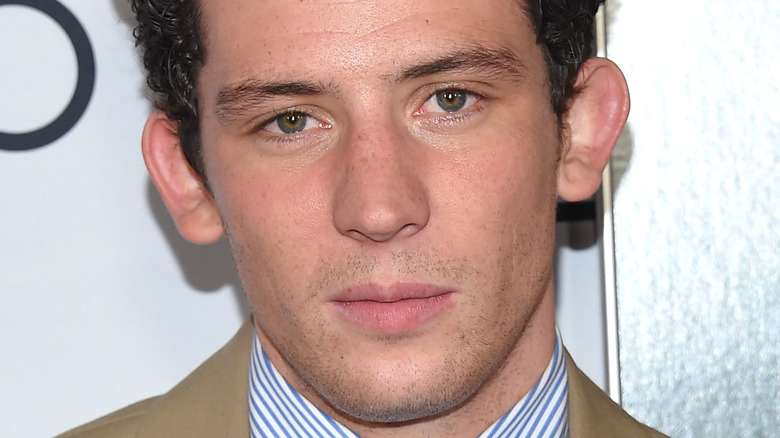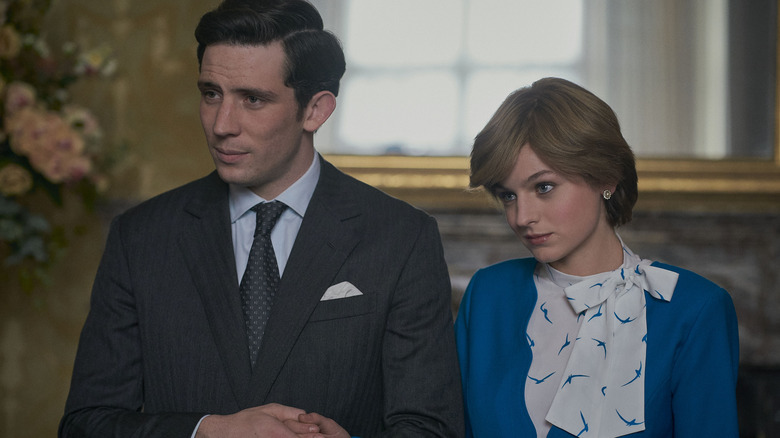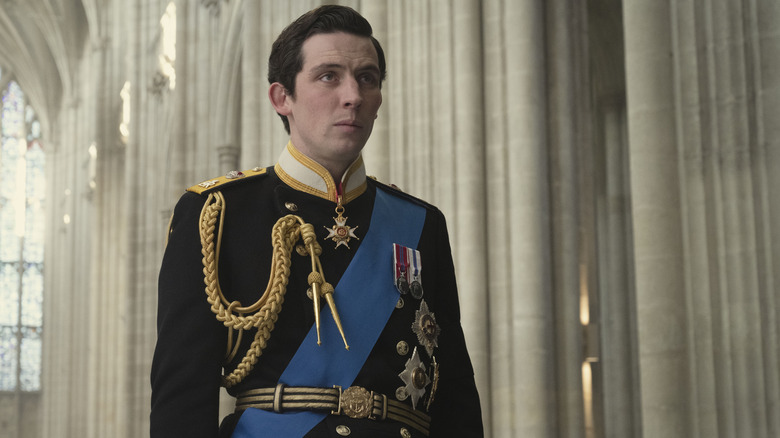What Josh O'Connor Really Thinks About The Royal Family
The British royal family is an undeniable part of the public persona associated with Josh O'Connor. While known among certain circles in his native U.K., the actor became a household name in 2016 when he played the young Prince Charles in the Netflix hit series "The Crown." For his incredibly nuanced portrayal of the heir to the British throne, O'Connor was recognized with both a Golden Globe and an Emmy in 2021. O'Connor was up against the likes of Al Pacino, Matthew Rhys, Jason Bateman, and Billy Potter, among other talented actors with more experience, so O'Connor was understandably (and adorably) surprised to hear his name called. "That's quite a surprise," he said, visibly emotional during his virtual acceptance speech at the Golden Globes.
Season 4 of "The Crown" is the show's most popular to date, according to Business Insider — a season that sees a heightened focus on Charles and Princess Diana, portrayed by Emma Corrin, who also bagged the Golden Globe this year. O'Connor won't be returning for Season 5, however, as the timeline will jump forward, with Dominic West playing the older prince, according to Elle.
Whether he likes it or not, O'Connor's acting career was jumpstarted thanks to the royals. O'Connor will surely go on to achieve great things in his acting career, but his portrayal of Charles will remain high on his list of great performances. However, how O'Connor really feels about the British royal family is a whole different matter.
Josh O'Connor has no interest in the royal family
Josh O'Connor loved playing Prince Charles in "The Crown," he told British GQ. He didn't even watch the instantly infamous interview Prince Harry and Meghan Markle did with Oprah Winfrey, which had just taken place at the time. "I don't feel that bad about it, to be honest," he told GQ. In fact, portraying the probable future king on the small screen has done little to pique his curiosity about the real royal family. "I had no interest in the royal family before I did 'The Crown.' And I have very little interest now!" O'Connor said.
As a liberal who would rather see the U.K. turn into a republic, O'Connor couldn't bother paying attention to an institution he doesn't believe in, he told The Guardian. However, he is appreciative that the family has largely tried to stay out of the tabloids. "In some ways I respect them for the way they've balanced things. Because they exist, and we can forget about them if we want to, and maybe that's a tactical thing," he said.
Speaking with The Hollywood Reporter, O'Connor admitted that playing Charles made him more understanding of the prince. But that doesn't mean he's setting alarms to get the latest on him. "I suppose I do feel defensive in a certain way, I guess ... [but] any conversation about, 'Gee, what did you think about what Charles said last week?' I'm like, 'Guys, I have no idea,'" he added, laughing.
Josh O'Connor initially refused to read for 'The Crown'
Josh O'Connor's political views almost prevented him for even auditioning for the role of Prince Charles, as the actor had little interest in fueling the public's obsession with the royal family, he told The Irish Times. But O'Connor was impressed by creator and writer Peter Morgan's take and caved. "We were telling a kind of unheard, voiceless Charles," he said.
When O'Connor finally accepted the invitation to read for the part, he was given a very specific scene to read during his audition. In it, Charles talks about his future and what his life means in the grand scheme of things, and compares his life to the character in the novel "Dangling Man" — a man who believes going to war will give his life meaning. "And then he says, 'I'm essentially waiting for my mother to die in order for my life to take meaning.' I read that line and I was like, 'Well, that's enough to get your teeth into,'" O'Connor recalled.
In his portrayal of the "voiceless Charles," O'Connor attempted to inject a sort of nuanced rebellion to the character, but was always told to hold back, he told The Guardian. "I felt I had to advocate for him, a bit, and give him a voice," he said. "And always [when I made that case] the answer came back, 'No. This is the point, he doesn't have a voice, not yet.'"



